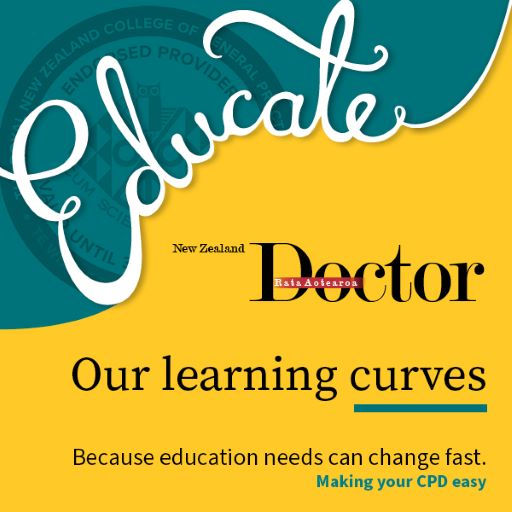Respiratory physician Lutz Beckert considers chronic obstructive pulmonary disease management, including the prevention of COPD, the importance of smoking cessation and pulmonary rehabilitation, and the lifesaving potential of addressing treatable traits. He also discusses the logic of inhaler therapy, moving from single therapy to dual and triple therapy when indicated, as well as other aspects of management
Independence in older age requires a lifetime of independence
Independence in older age requires a lifetime of independence

Here at New Zealand Doctor Rata Aotearoa we are on our summer break! While we're gone, check out Summer Hiatus: Stories we think deserve to be read again! This article was first published on 11 May 2022.
Specialist GP Ngaire Kerse reflects on what helps keep older people independent, including the factors throughout life that primary care can have an impact on
- Physical activity, brain stimulation, optimal management of medications and health conditions, having supportive and positive people available, and having a sense of purpose and autonomy all help to maintain independence in older age.
- Independence in older age is affected by growth and development in infancy and childhood, and by modifiable risk factors and socioeconomic status throughout life.
- Taking a preventive and strengths-based approach to healthcare delivery throughout life can have a substantial impact on your patients’ independence in ageing.
This article has been endorsed by the RNZCGP and has been approved for up to 0.25 CME credits for continuing professional development purposes (1 credit per learning hour). To claim your credits, log in to your RNZCGP dashboard to record this activity in the CME component of your CPD programme.
Nurses may also find that reading this article and reflecting on their learning can count as a professional development activity with the Nursing Council of New Zealand (up to 0.25 PD hours).
The importance of independence for older people is pretty well known, and GPs and nurse practitioners will have dealt with transitions, decline and recovery in their older patients. As New Zealand emerges from the restrictions of the pandemic, it is useful to reflect on what it is that keeps older people independent.
I have observed the independence of loved ones and patients reducing over the two years of the pandemic, and they will require significant encouragement for this to reverse.
Life and Living in Advanced Age, a Cohort Study in New Zealand (LiLACS NZ) shows us that naturally there is a flux in functional status for those in the 80 and over age group, with as many staying the same or improving as declining.1 Of course, this assumed usual family, whānau and social activities were available.
Physical activity is essential for functional independence. The more steps per day the better,2 and increasing levels of activity preserves and improves functional status, prevents falls and is a national imperative for all. Older people don’t do as much activity as when they were younger, and those with physical impairment and social deprivation do even less. Start now with easy, accessible activity that can’t be avoided; make it habitual and ongoing to preserve functional independence in ageing.
Think of innovative ways to enable activity in daily life for older people, and help them make it happen. A really good idea is to constantly and repeatedly refer them to the community exercise programme facilitated by ACC through your local health service. For the Auckland region, this is through CareConnect eReferrals, and there are many providers of appropriate exercise. In-home exercise is also available for those who can’t make it out.
Optimal management of health conditions and reduction of medication-related harms are needed for maintenance of independence. This is your job, and attention to updated management trends, new medications and appropriate use of old ones all helps.
LiLACS NZ found that omissions of appropriate medication were more predictive of hospitalisations and mortality than inappropriate use.3 The omitted medications included bisphosphonates and those for cardiovascular disease risk management, among others.
However, the factors that promote independence are more than just good health.
The environment and context of the older person makes a big difference. For some, the natural requirement of maintaining a house means walking to the mailbox, attending to the garden and thinking about the maintenance. For those in smaller dwellings, the requirements are smaller and, therefore, the amount of habitual activity is smaller.
Having supportive and positive people around the older person contributes to wellbeing and the ability to undertake activities. Attention to family and social relationships, including their quality and quantity, may lead to action towards enabling positive interactions.
A sense of purpose, the economic and social resources to pursue that purpose, and the autonomy to make it happen on the older person’s terms, also promotes independence. It’s a cycle – achieving purposeful actions promotes independence, and, in turn, independence enables pursuit of meaningful activities. Thinking broadly about the implications of this in all our roles will enable older people to flourish and recover from forced constraints related to the pandemic, incidental disease and health events.
Autonomy for all older people to make decisions, and the resources to follow through on them, cannot be overemphasised. This applies to Māori and all cultural groups. For those with a collective societal view, the ability to participate in whānau and societal decisions, decide to fulfil leadership roles and fully participate in the life they choose will sustain independence.
Autonomy means choosing where to live and who with, when to go to bed, when to turn out the light, what to eat and when, etc. This autonomy stimulates brain activity, as does physical activity and social and environmental interaction, and contributes to the cycle of sustainable independence. Even when older people have some cognitive impairment, they require as much autonomy as can safely be achieved, to maintain their independence, feel respected and know they are contributing to society.
Brain stimulation can be accomplished in many ways. Talking, thinking, reading with immediate recall and use of the information read, social interactions, making connections with things and people (eg, visiting museums, understanding whakapapa and your place in the world), and past and future events have all been shown to be beneficial.
Physical exercise, especially dual-task exercise where the exercise is cognitively challenging (kapa haka is a great example), is especially important. Cognitive challenge with puzzles and crosswords is helpful, especially if taken in a social context. Wordle may be altering the cognitive trajectory of the world!
To be independent in older age, one must be independent when reaching older age
To be independent in older age, one must be independent when reaching older age. The figure shows different trajectories for independent ageing and for ageing less independently.
Birth weight predicts strength in late life, and if growth and development in infancy and childhood does not proceed optimally, maximal functional levels will be lower. This also applies to mental health trajectories, and we can all think of patients who have been destroyed psychologically and physically from trauma of various sorts in childhood. Nutrition and brain stimulation early on are really important for realising potential.
In adult life, there are many things that can impact independence in older age. The 2020 Lancet Commission report on dementia prevention, intervention and care is a great example and easy reading.4 If the risk factors found to be associated with development of dementia were addressed through health and social services (low education in early life; hearing loss, obesity, hypertension in midlife; depression, smoking, physical inactivity, diabetes, and social isolation in late life), 35 per cent of cases of dementia could be prevented.
This is primary care’s job!
Of factors less easy to impact, low socioeconomic position makes independence in older age less likely, whether low socioeconomic status was in childhood, adult years or older age. This is government policy’s job.
There is good evidence that frailty can be detected in people aged 40 to 50. The lower end of the range of muscle strength and cognitive function is detectable, but trials to impact ongoing “low-trajectory status” have not been able to show impact, probably because we need sustainable change in lifestyle and ongoing preventive opportunities.
Being frail is a strong predictor of losing independent function, and taking a preventive and strengths-based approach to our healthcare delivery throughout life can have a substantial impact on independence in ageing.
Over the next months of the health reforms, we all hope there will be room for more social cohesion, attention to independence for older people and consideration of prevention approaches throughout the life course. Let’s all be on the lookout for opportunities to promote independence in any way possible.
Ngaire Kerse is a professor of general practice and primary health care, and the Joyce Cook Chair in Ageing Well, University of Auckland
You can use the Capture button below to record your time spent reading and your answers to the following learning reflection questions:
- Why did you choose this activity (how does it relate to your professional development plan learning goals)?
- What did you learn?
- How will you implement the new learning into your daily practice?
- Does this learning lead to any further activities that you could undertake (audit activities, peer discussions, etc)?
We're publishing this article as a FREE READ so it is FREE to read and EASY to share more widely. Please support us and the hard work of our journalists by clicking here and subscribing to our publication and website
1. Kerse N, Lapsley H, Moyes S, et al. Health, Independence and Caregiving in Advanced Age: Findings from LiLACS NZ. University of Auckland. https://www.fmhs.auckland.ac.nz/assets/fmhs/faculty/lilacs/research/docs/Health-Independence-and-Caregiving-in-Advanced-Age-updated031016).pdf
2. Klenk J, Kerse N. Every step you take. BMJ 2019; 366:l5051.
3. Ryan C, Teh R, Moyes S, et al. Quality of prescribing predicts hospitalisation in octogenarians: life and living in advanced age: a cohort study in New Zealand (LiLACS NZ). BMC Geriatr 2019;19(1):357.
4. Livingston G, Huntley J, Sommerlad A, et al. Dementia prevention, intervention, and care: 2020 report of the Lancet Commission. Lancet 2020;396(10248):413–46.
Figure adapted from: Eldemire-Shearer D, Mitchell-Fearon K, Laws H, et al. Ageing of Jamaica's population -- What are the implications for healthcare? West Indian Med J 2014;63(1):3–8.







![Barbara Fountain, editor of New Zealand Doctor Rata Aotearoa, and Paul Hutchison, GP and senior medical clinician at Tāmaki Health [Image: Simon Maude]](/sites/default/files/styles/thumbnail_cropped_100/public/2025-03/Barbara%20Fountain%2C%20editor%20of%20New%20Zealand%20Doctor%20Rata%20Aotearoa%2C%20and%20Paul%20Hutchison%2C%20GP%20and%20senior%20medical%20clinician%20at%20T%C4%81maki%20Health%20CR%20Simon%20Maude.jpg?itok=-HbQ1EYA)
![Lori Peters, NP and advanced health improvement practitioner at Mahitahi Hauora, and Jasper Nacilla, NP at The Terrace Medical Centre in Wellington [Image: Simon Maude]](/sites/default/files/styles/thumbnail_cropped_100/public/2025-03/2.%20Lori%20Peters%2C%20NP%20and%20advanced%20HIP%20at%20Mahitahi%20Hauora%2C%20and%20Jasper%20Nacilla%2C%20NP%20at%20The%20Terrace%20Medical%20Centre%20in%20Wellington%20CR%20Simon%20Maude.jpg?itok=sUfbsSF1)
![Ministry of Social Development health and disability coordinator Liz Williams, regional health advisors Mary Mojel and Larah Takarangi, and health and disability coordinators Rebecca Staunton and Myint Than Htut [Image: Simon Maude]](/sites/default/files/styles/thumbnail_cropped_100/public/2025-03/3.%20Ministry%20of%20Social%20Development%27s%20Liz%20Williams%2C%20Mary%20Mojel%2C%20Larah%20Takarangi%2C%20Rebecca%20Staunton%20and%20Myint%20Than%20Htut%20CR%20Simon%20Maude.jpg?itok=9ceOujzC)
![Locum GP Helen Fisher, with Te Kuiti Medical Centre NP Bridget Woodney [Image: Simon Maude]](/sites/default/files/styles/thumbnail_cropped_100/public/2025-03/4.%20Locum%20GP%20Helen%20Fisher%2C%20with%20Te%20Kuiti%20Medical%20Centre%20NP%20Bridget%20Woodney%20CR%20Simon%20Maude.jpg?itok=TJeODetm)
![Ruby Faulkner, GPEP2, with David Small, GPEP3 from The Doctors Greenmeadows in Napier [Image: Simon Maude]](/sites/default/files/styles/thumbnail_cropped_100/public/2025-03/5.%20Ruby%20Faulkner%2C%20GPEP2%2C%20with%20David%20Small%2C%20GPEP3%20from%20The%20Doctors%20Greenmeadows%20in%20Napier%20CR%20Simon%20Maude.jpg?itok=B0u4wsIs)
![Rochelle Langton and Libby Thomas, marketing advisors at the Medical Protection Society [Image: Simon Maude]](/sites/default/files/styles/thumbnail_cropped_100/public/2025-03/6.%20Rochelle%20Langton%20and%20Libby%20Thomas%2C%20marketing%20advisors%20at%20the%20Medical%20Protection%20Society%20CR%20Simon%20Maude.jpg?itok=r52_Cf74)
![Specialist GP Lucy Gibberd, medical advisor at MPS, and Zara Bolam, urgent-care specialist at The Nest Health Centre in Inglewood [Image: Simon Maude]](/sites/default/files/styles/thumbnail_cropped_100/public/2025-03/7.%20Specialist%20GP%20Lucy%20Gibberd%2C%20medical%20advisor%20at%20MPS%2C%20and%20Zara%20Bolam%2C%20urgent-care%20specialist%20at%20The%20Nest%20Health%20Centre%20in%20Inglewood%20CR%20Simon%20Maude.jpg?itok=z8eVoBU3)
![Olivia Blackmore and Trudee Sharp, NPs at Gore Health Centre, and Gaylene Hastie, NP at Queenstown Medical Centre [Image: Simon Maude]](/sites/default/files/styles/thumbnail_cropped_100/public/2025-03/8.%20Olivia%20Blackmore%20and%20Trudee%20Sharp%2C%20NPs%20at%20Gore%20Health%20Centre%2C%20and%20Gaylene%20Hastie%2C%20NP%20at%20Queenstown%20Medical%20Centre%20CR%20Simon%20Maude.jpg?itok=Z6u9d0XH)
![Mary Toloa, specialist GP at Porirua and Union Community Health Service in Wellington, Mara Coler, clinical pharmacist at Tū Ora Compass Health, and Bhavna Mistry, specialist GP at Porirua and Union Community Health Service [Image: Simon Maude]](/sites/default/files/styles/thumbnail_cropped_100/public/2025-03/9.%20Mary%20Toloa%2C%20Porirua%20and%20Union%20Community%20Health%20Service%20in%20Wellington%2C%20Mara%20Coler%2C%20T%C5%AB%20Ora%20Compass%20Health%2C%20and%20Bhavna%20Mistry%2C%20PUCHS%20CR%20Simon%20Maude.jpg?itok=kpChr0cc)